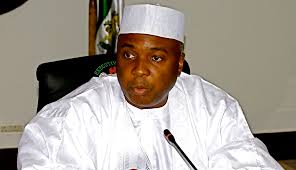OPINION: CCT and a Timeline of Inconsistencies
Articles/Opinion, Featured, Featured Contributors/Columnists, Latest Headlines Tuesday, April 26th, 2016
By Bamikole Omishore
NALTIMORE, MD (AFRICAN EXAMINER) – Potter Stewart, a renown Associate Justice of the United States Supreme Court who played a significant role in the interpretation of Civil Rights laws, coined the basic phrase: “Fairness is what Justice really is.” This phrase, conceived to propel the notion of every individual’s equitable right under the law, demonstrates that an unbiased legal system, is a necessary component for justice to be dispensed.
As things stand, the case of the Code of Conduct Tribunal (CCT) against the Senate President, Dr. Abubakar Bukola Saraki, has proven to be full of contradictions and inequity. ‘Contradictions’ because since the case was in its preliminary stages, there has been a mismatch between the facts being propelled by the prosecution, the methods being employed by the tribunal, and the charges that have been brought against the Senate President.
Since the case was brought to light in late 2015, few weeks after Dr. Saraki’s emergence as President of the Senate, members of the Nigerian public have come to understand that the charges against Saraki, and the testimony of the chief witness have not been in sync.
Additionally, Nigerians have started to also understand that certain legal precedents have not been followed by the tribunal. For example, based on the non-adherence to Section 3, paragraph D of the act that established the Code of Conduct Bureau (CCB) and the Tribunal, the Senate President ought to be given an opportunity to respond to the charges brought against him.
One noteworthy instance that comes to mind is that in 2007, the CCT dismissed the charges against former Vice-President, Atiku Abubakar based on the non-adherence to the precedent clause. Another ocassion, in 2011, the same CCT quashed the case against Bola Ahmed Tinubu on the same ground. However, in what has been described by many legal practitioners as an abuse of judicial precedent, the same judicial body, with the same Chairman that delivered the Tinubu judgement, went back on the legal precedent that it had set on several occasions, and threw out the proviso which created a condition precedent clause before the law can be applied against Saraki case.
What was even more disturbing, was the self-indictment by Dan Ladi Umar in the case, as he casually revealed that Tinubu’s ruling was simply “made in error.” This outright reversal stirs up questions regarding if Umar was under duress when he delivered his judgement; if the tribunal understands the legal implications of their actions; and if the same 1999 Constitution and Code of Conduct Bureau acts were not the documents used in the cases of Atiku and Tinubu.
Furthermore, the contributions of the prosecution’s Chief Witness, Michael Wetkas, an operative of the Economic and Financial Crimes Commission (EFCC), has poked further holes in the prosecution’s case.
Some clear examples are Wetkas admitting that neither he nor his team investigated three crucial exhibits (11, 12, and 13) tendered as evidence against the Senate President. Another example is the witness mentioning that it was the EFCC that investigated Saraki, as opposed to agents from the CCB. In essence, the case before the CCT now is money laundering, instead of false Asset Declaration which it is created to handle.
These inconsistencies lend credence to what the Senate President and his team have been saying for a while: “This case is not about prosecuting alleged corruption, but about some powerful individuals settling political scores, using their control of the judiciary.”
Finally, in another ruling by the Chairman of the CCT that demonstrates his bias in the Saraki situation, Mr. Danladi Umar mandated the trial of the Senate President to proceed on a day-to-day basis – citing the Administration of Criminal Justice Act (ACJA), despite the fact that he has adjourned other cases – that are also under the purview of the ACJA.
This situation came to a head on Wednesday, April 20th, 2016, when the Counsel for the Former Minister of Niger Delta, Godsday Orubebe, argued that because the trial had earlier been moved from April 14 to 20 for continuation, their case should be heard before Saraki’s case which was adjourned just a day before. However, Justice Umar insisted that the Senate President’s case must continue, and stood down Orubebe’s case – leaving many to question if in fact there is a timeline (as some have speculated) to convict Saraki by hook or by crook before a certain date.
As the head of the Senate President’s New Media team, based on all these observations, it has become not only necessary, but mandatory to let the Nigerian public know that as things stand, the case against my principal, the Senate President, is concocted on shaky evidence as the outcome of the on-going cross-examination has indicated. As the prosecution is attempting to make this a media trial, I enjoin Nigerians to urge the CCT to make this a trial that is based on the substance and the spirit of the law. Doing this, would ensure that the process is free and fair, so that at the end of the day, we can all be able to claim that justice was in fact done.
Bamikole Omishore is the Special Assistant on New Media to President of the Senate.
Related Posts
Short URL: https://www.africanexaminer.com/?p=32162






















